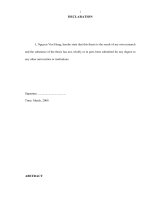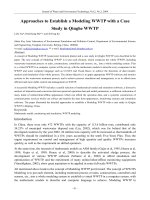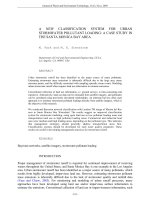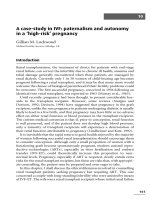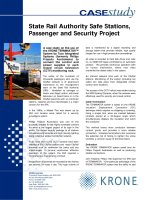chapter 13financial modeling case study in forestry project evaluation
Bạn đang xem bản rút gọn của tài liệu. Xem và tải ngay bản đầy đủ của tài liệu tại đây (553.26 KB, 16 trang )
1
Chapter 13:
FINANCIAL MODELING
CASE STUDY IN FORESTRY
PROJECT EVALUATION.
Description of a
generic computer
model for the
evaluation of various
forestry investments.
2
Forestry Investment
Computer Models
To evaluate the NPV and LEV of
particular plantations.
The roles of modelling in
forestry investment.
To allow sensitivity and risk
analyses of forecast variables.
To facilitate analysis of
various cropping scenarios:
eg; harvest lives, planting
regimes, species mixtures.
3
Forestry Models
Modelling is useful because:
1. There are many data types.
2. The computational inter-relationships
between data types are complex: eg
rainfall/soil type/location/species.
3. Plantation life spans are very long.
4. Many scenarios are possible.
4
Forestry Models:
Specific Vs Generic
A Specific model can evaluate
individual forestry projects.
A Generic model can evaluate a variety
of separate investment projects for a
variety of users.
5
Forestry Models:
Specific Vs Generic Choice
Specific –
Shorter development time
easier to develop
less data required
limited to one user/one application
a once off application means that
there are no economies of scale.
6
Forestry Models:
Specific Vs Generic Choice
Generic –
multiple applicability means
economies of scale
wide range of users and applications
can be commercially marketed
long development time
extensive data required
data relationships more complex.
7
Forestry Investment
Computer Models
There are two types:
1. For evaluating forestry
investments as
independent projects
1. For evaluating forestry
projects within the
overall operations of a
business firm.
8
Forestry Investment
Computer Models
Who are the ultimate
users?
Model Design Considerations I:
What software
should be used to
build the model ?
What hardware
platform should be
employed?
9
Forestry Investment
Computer Models
How is the model going
to be tested?
Model Design Considerations II:
What type of user
interface is best
Who is responsible for
maintenance and
updates?
10
Forestry Investment
Computer Models
Ch 13 reviews a generic computer
model: the ACTFM
Australian Cabinet Timbers Financial Model.
This model:
Suits investors, consultants, landholders,
and government agencies
Covers over 30 native species
Uses linked sheets in an Excel workbook
Is menu driven.
11
ACTFM- Behind the Scenes
1. Information about the program; data
relating to MAI’s, stumpage prices,
and harvest ages of over 30 different
cabinet timber species
2. Data relating to plantation
establishment and maintenance costs
3. Input tables for the entry of
alternative MAIs, prices and costs,
and harvest age data
4. Pages containing visual basic code.
The Excel sheets behind the menus hold:
12
ACTFM- Behind the Scenes
A picture of the logical layout.
13
ACTFM- The User Interface
An output screen showing results
calculated from input selections.
14
ACTFM- The User Interface
Selected dialog screens
An annual cost sheet
A prescriptive
cost sheet
15
ACTFM- The User Interface
“Costs
during
plantation”
sheet
A dialog screen.
16
ACTFM
A Generic Computer Model
This model was difficult to
develop as it required extensive
data collection, complex
computational formulation, and
extensive interface planning,
but it is very successful, and has
wide application.
